Lakeview Terrace
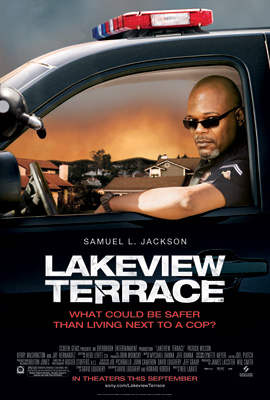
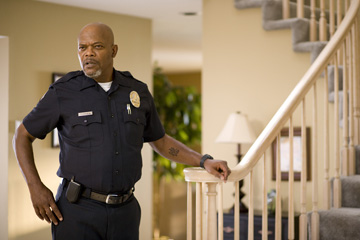 The title stems from the film's setting - a quiet upscale suburban community in California. Young married couple Chris (Patrick Wilson) and Lisa (Kerry Washington) Mattson have just bought their first house, and are excited about the possibilities about their new lives, and maybe starting a family. (At least Lisa is excited to have children. Chris seems more unsure.) Not long after moving in, they meet their new neighbor, Abel Turner (Samuel L. Jackson). Abel is a veteran cop with the LAPD, a widower trying to raise two children, and lives a very strict and mannered lifestyle, almost to the point of obsession. Abel takes an instant disliking to his neighbors, due to the fact that they are an interracial couple. He also looks down on them, due to a lack of moral standing in his eyes, especially after he spies them swimming naked in their backyard pool. Abel eventually decides that he does not want people like the Mattsons living next door to them, and begins a personal campaign to drive them away, all the while trying his best to hide his issues with them, even though he doesn't do a good job and Chris can practically feel Abel's hatred for him whenever they're together. Meanwhile, a raging California wildfire is making its way slowly toward the community, which seems to act as a symbolism to the growing tension between them.
The title stems from the film's setting - a quiet upscale suburban community in California. Young married couple Chris (Patrick Wilson) and Lisa (Kerry Washington) Mattson have just bought their first house, and are excited about the possibilities about their new lives, and maybe starting a family. (At least Lisa is excited to have children. Chris seems more unsure.) Not long after moving in, they meet their new neighbor, Abel Turner (Samuel L. Jackson). Abel is a veteran cop with the LAPD, a widower trying to raise two children, and lives a very strict and mannered lifestyle, almost to the point of obsession. Abel takes an instant disliking to his neighbors, due to the fact that they are an interracial couple. He also looks down on them, due to a lack of moral standing in his eyes, especially after he spies them swimming naked in their backyard pool. Abel eventually decides that he does not want people like the Mattsons living next door to them, and begins a personal campaign to drive them away, all the while trying his best to hide his issues with them, even though he doesn't do a good job and Chris can practically feel Abel's hatred for him whenever they're together. Meanwhile, a raging California wildfire is making its way slowly toward the community, which seems to act as a symbolism to the growing tension between them.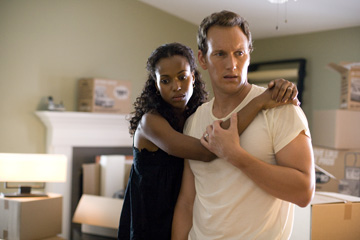 Lakeview Terrace earns some points early on by treating its characters as actual people for most of its running time, especially Jackson's character. His Abel Turner is not a psycho cop, he is simply a man with very strict and unfailing beliefs, no matter how wrong they may be. The movie takes its time to introduce him to us and his beliefs before the Mattsons even move in next door, and we see his homelife with his two children. The movie's attempts to flesh out his character, and that of Chris and Lisa, were reassuring to me that screenwriters David Loughery and Howard Korder were not going to take the straight-forward and easy approach at least. These are all flawed people who are trying to do the right thing. In Abel's eyes, he's trying to be a good father, and is trying to "protect" his kids from the corruption he sees next door. Chris and Lisa aren't exactly perfect, either. There's a lot of tension between them, based on how everyone looks at their interracial relationship. It's obvious from a scene at a restaurant where they have lunch with Lisa's father that there is family tension about Lisa's decision to marry Chris, not because of who he is and his lifestyle, but because of what he is. The movie is surprisingly subtle in dealing with racial issues, and the performances are honestly low key for the most part.
Lakeview Terrace earns some points early on by treating its characters as actual people for most of its running time, especially Jackson's character. His Abel Turner is not a psycho cop, he is simply a man with very strict and unfailing beliefs, no matter how wrong they may be. The movie takes its time to introduce him to us and his beliefs before the Mattsons even move in next door, and we see his homelife with his two children. The movie's attempts to flesh out his character, and that of Chris and Lisa, were reassuring to me that screenwriters David Loughery and Howard Korder were not going to take the straight-forward and easy approach at least. These are all flawed people who are trying to do the right thing. In Abel's eyes, he's trying to be a good father, and is trying to "protect" his kids from the corruption he sees next door. Chris and Lisa aren't exactly perfect, either. There's a lot of tension between them, based on how everyone looks at their interracial relationship. It's obvious from a scene at a restaurant where they have lunch with Lisa's father that there is family tension about Lisa's decision to marry Chris, not because of who he is and his lifestyle, but because of what he is. The movie is surprisingly subtle in dealing with racial issues, and the performances are honestly low key for the most part.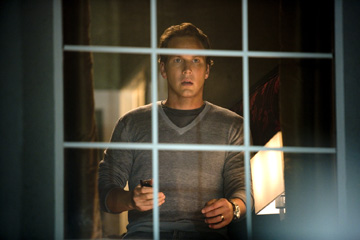 The movie starts to betray the promise it created about halfway through, when it decides to turn Jackson's character from a too concerned for his own good neighbor, into a sneering madman who slashes the couple's tires, and hires someone to break into their house and ransack it. It comes across as if the writers didn't know what to do. They were trying to write a thoughtful and intelligent dramatic thriller about race relations, and then they just start to go on auto pilot. This is when the movie starts to go downhill, leading to a climax that is loud, dumb, and pretty much against everything that came before it. It would fit maybe in a more violent and sensationist movie, but here, it sticks out like a sore thumb. People who seemed intelligent suddenly start making dumb decisions just to fuel the plot and keep things moving, and Samuel L. Jackson starts going more and more over the top. The movie tries to explain this change in his behavior at least in some way. It also wisely writes his two kids out of the movie halfway through so they don't get involved, which would be pretty exploitive. Doesn't make it feel like any less of a cop out, though.
The movie starts to betray the promise it created about halfway through, when it decides to turn Jackson's character from a too concerned for his own good neighbor, into a sneering madman who slashes the couple's tires, and hires someone to break into their house and ransack it. It comes across as if the writers didn't know what to do. They were trying to write a thoughtful and intelligent dramatic thriller about race relations, and then they just start to go on auto pilot. This is when the movie starts to go downhill, leading to a climax that is loud, dumb, and pretty much against everything that came before it. It would fit maybe in a more violent and sensationist movie, but here, it sticks out like a sore thumb. People who seemed intelligent suddenly start making dumb decisions just to fuel the plot and keep things moving, and Samuel L. Jackson starts going more and more over the top. The movie tries to explain this change in his behavior at least in some way. It also wisely writes his two kids out of the movie halfway through so they don't get involved, which would be pretty exploitive. Doesn't make it feel like any less of a cop out, though.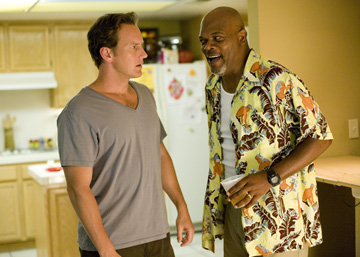 What makes the direction the film ultimately goes in even more disappointing is that during its more quiet moment, Jackson's performance here is very good. He doesn't try to make Abel Turner into a likable person, but he at least doesn't seem to be trying to make us hate him right up front. There's a scene where he's in a bar with Chris and talking about the day his wife died. Not only does it offer a window into why he thinks the way he does, but it's also a genuinely effective scene and performance from him. Patrick Wilson and Kerry Washington are good too in their roles, if not a little bland. This is clearly Jackson's movie, and they seem to know it. These performances deserve the movie the first half was trying to be, which gives the climax an even more bitter taste. You had to wonder if anyone stopped and asked director LaBute if there was perhaps another way to end this thing, one which didn't go against the characters they had been building.
What makes the direction the film ultimately goes in even more disappointing is that during its more quiet moment, Jackson's performance here is very good. He doesn't try to make Abel Turner into a likable person, but he at least doesn't seem to be trying to make us hate him right up front. There's a scene where he's in a bar with Chris and talking about the day his wife died. Not only does it offer a window into why he thinks the way he does, but it's also a genuinely effective scene and performance from him. Patrick Wilson and Kerry Washington are good too in their roles, if not a little bland. This is clearly Jackson's movie, and they seem to know it. These performances deserve the movie the first half was trying to be, which gives the climax an even more bitter taste. You had to wonder if anyone stopped and asked director LaBute if there was perhaps another way to end this thing, one which didn't go against the characters they had been building.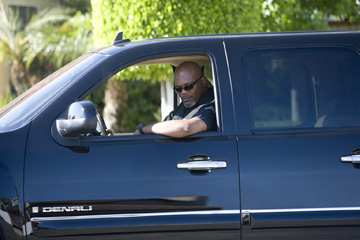
See the movie times in your area or buy the DVD at Amazon.com!






1 Comments:
I came across an online community for individual seeking interracial love. It is ++++((((---Blackwhitemeet. C O M))))++++ All singles there are seeking interracial relationships. Interracial is not a problem here, but a great merit to cherish!
By Unknown, at 7:41 AM
Unknown, at 7:41 AM
Post a Comment
<< Home